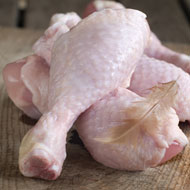Top retailers to do their own campylobacter testing

Overall, campylobacter levels in shop-bought chickens have steadily fallen since the FSA began sampling.
The UK’s top nine supermarket chains are set to carry out campylobacter testing on their own chickens, and will publish results on their websites, the Food Standards Agency (FSA) has announced.
Campylobacter surveys of fresh shop-bought chickens have been carried out by the FSA since 2014. However, the FSA will no longer include the nine biggest retailers in its survey, following discussions with the industry.
Major retailers and producers have made significant progress in reducing campylobacter levels in their chickens. In light of this, the FSA says it now plans to focus its efforts on smaller establishments, where it believes further improvements are needed.
Overall, campylobacter levels in shop-bought chickens have steadily fallen since the FSA began sampling. The last set of results showed 48.8 per cent of chicken skin samples tested positive, compared to 73 per cent in 2015.
Therefore, the focus of the next retail survey will be on smaller retailers, independent traders and market stalls, as these are likely to be supplied by smaller processors. Generally, these have not made the same level of improvements as the bigger chains.
Meanwhile, the nine large retailers have agreed to publish their own results on their consumer websites. Sampling and analyses will be carried out according to the FSA’s robust protocols, to ensure the results are comparable.
The FSA will have access to the raw data from all retailers, and reserves the right to comment publicly on them. The food watchdog says it will be monitoring their results very closely to ensure they continue to show improvements in campylobacter levels.



 The BSAVA has opened submissions for the BSAVA Clinical Research Abstracts 2026.
The BSAVA has opened submissions for the BSAVA Clinical Research Abstracts 2026.